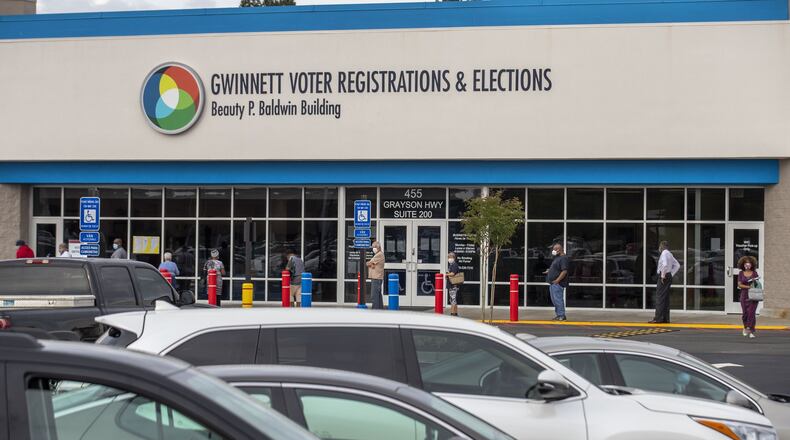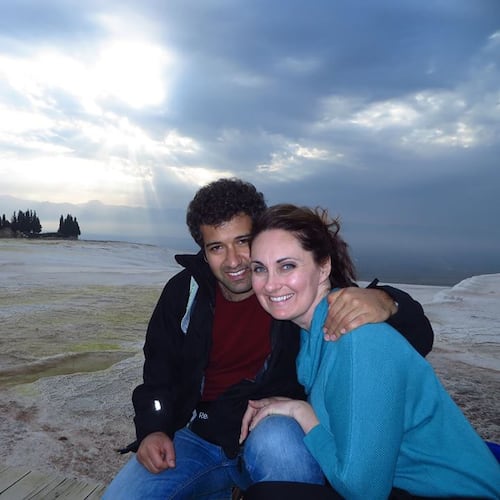Gwinnett County Democrats took seven of the county’s 25 Legislature seats away from Republicans in 2018. Now, they have to hold onto them.
State Rep. Jasmine Clark is one of those Democrats, preparing to defend her Lilburn-area seat for the first time since winning it in 2018 in one of the state’s closest House races that year. Running against her for House Dist. 108 is Lilburn Mayor Johnny Crist, who resigned from his post in March to dedicate his time to the campaign.
Clark, a 37-year-old microbiologist and Emory University lecturer, never saw herself as a politician. But the election of President Donald Trump was a wake-up call for Clark.
“The first thing Trump did after getting elected was go after the science community, and particularly the climate science community,” Clark said. “Science is my passion. Science is my love. Politics is not something I thought I would get into, but I believe that when there is something that needs to be said, you can’t wait on the next person to say it, and when there’s something that needs to be done, you can’t wait for the next person to do it.”
First, Clark was chosen as a leader for Atlanta’s March for Science in early 2017. The high turnout-— more than 10,000 people — inspired her to get more politically involved. She saw that her state representative, Republican Clay Cox, was running for re-election unopposed and decided to challenge him. She won by fewer than 300 votes.
Crist had hoped Cox would try to win back the district, but Cox had another idea.
“He asked me, ‘Will you get off the bench and run?’” Crist said, recalling a conversation from late 2019. “My first thought was, ‘He’s considering being mayor on the bench?’”
Crist wasn’t sure at first. He was just beginning another four-year term. But more encouragement from fellow local Republicans and some serious discussions with his wife led him to take the leap. He resigned in March to focus on the campaign.
Crist, 69, always had an idea of public service tucked away in his mind, starting as a kid with annual family trips to Washington, D.C. But for most of his adult life, he engaged in service through ministry, not government. He founded Atlanta Vineyard Church and was its senior pastor. He and his wife Anne raised eight kids in Lilburn and restored a historic house across the street from City Hall. By his own admission, he had his hands full. It was only after a few neighbors suggested he run for Lilburn City Council that he moved toward politics.
Crist was elected Lilburn mayor after his first council term, and was reelected unopposed twice. He resigned from his position just a few months after his 2019 re-election to pursue House District 108.
The diverse, middle-class suburban district covering the Lilburn and Mountain Park areas is deeply in play for the November election. Clark is the first Democrat to represent it in at least 15 years. Democrats have rapidly gained ground in Gwinnett County since it first flipped blue with a majority of voters choosing Hillary Clinton in the 2016 presidential election. It was the first time Gwinnett favored a Democratic presidential candidate in decades.
“I am not convinced that demographic shifts are causing a Republican disadvantage. We’re always hearing these lies of how there’s no way for a Republican to win in certain areas,” Crist said. “I do not buy into this narrative. What I do buy into is a line a senator gave me in the beginning: ‘He who works the hardest, wins.’”
Both candidates are putting in that hard work, but in different ways. Door-to-door campaigning was a staple of Clark’s 2018 race, but because of the coronavirus pandemic, she’s taken most of her campaign online and on the phone. The decision was a difficult one to make, but Clark said she thinks it’s best for her and her constituents' safety, and reflective of how the pandemic has affected her district.
Three of the five zip codes in the 108th District have some of the highest rates of COVID-19 cases by population in Gwinnett, according to the Gwinnett, Newton and Rockdale County Health Department. In ZIP codes 30044, 30047 and 30093, between 2.8 and 4.1% of the population had tested positive for the disease since March as of Sept. 14.
“Because so many people care about COVID in my community, I have to be very careful about how I campaign,” Clark said. “That voter contact is key — being seen and being heard. I have to think outside of the box because I am not doing canvassing.”
It’s not just campaigning that’s gone virtual for Clark; she teaches and attends legislative meetings via video conference, and she’s had to help her two kids with virtual learning since classes resumed in August.
Crist is still campaigning in person, frequently taking his golf cart into residential neighborhoods to spend an afternoon knocking on doors and speaking to voters on their front porches.
“I honestly look them in the eye to see what’s going on in their life,” Crist said. “Democrats, Republicans, independents — all people want to know that they’re cared for. Whatever party, they want to vote for a person.”
Crist said these front porch conversations have shown him what voters care about. Public safety and law enforcement are high on the list, he said, and his priorities match up. Some of the issues he’d most like to tackle in the Capitol are gang activity and human trafficking, issues Gov. Brian Kemp has also prioritized.
Crist also supports school choice and believes that while Gwinnett does need an expanded transit system that can help commuters get to work in and out of the county, MARTA should not be involved.
COVID-19 has been at the forefront of Clark’s conversations with voters, and she believes her scientific background is an asset in Georgia’s continued efforts to contain the disease.
The pandemic has also highlighted the need for accessible healthcare and Medicaid expansion, Clark said. Kemp has applied for Medicaid waivers that would extend eligibility to more poor Georgians, but Clark said that did not go far enough.
“To this date, [Medicaid expansion] is the only plan that will cover most people and cost the least amount of money,” Clark said. “We missed that opportunity to expand Medicaid. A little over a million Georgians didn’t have access to care in the middle of a pandemic. The pandemic just showed how worse that problem can be when you don’t have access to care for as many people as possible.”
Both candidates will continue on the campaign grind through election day. Crist estimates he talks to 50 voters a day on his golf cart trips. Clark is mainly reaching out through phone calls, social media and video conference events.
They’re separated by less than $10,000 in fundraising totals, with Clark reporting more than $24,000 cash on hand in a June ethics disclosure and Crist reporting nearly $16,000. Both see victory within reach, but neither believe it’s guaranteed.
“I don’t take anything for granted, and I don’t take any vote for granted,” Clark said. “I go into this race feeling like I have to fight as hard as I did in 2018 when I was a complete unknown and I had to fight my way up from the bottom.”
About the Author
The Latest
Featured


